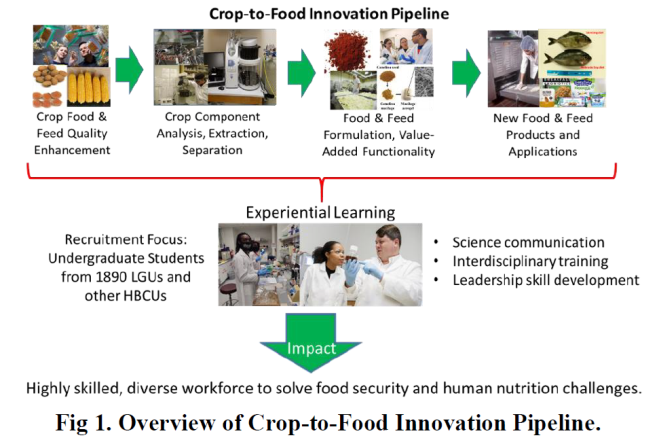
Lincoln, Neb. —A University of Nebraska-Lincoln (UNL) research team has been awarded $742K grant from the USDA NIFA’s Agriculture Food Research Initiative and Workforce Development Program to establish the Research and Extension Experiences for Undergraduates (REEU) program. This five-year “Crop-to-Food Innovation” program will give students 10-week summer research experiences and scientific communication and leadership training. The project will create opportunities for students to work with scientists who develop new crop traits and apply innovative bioprocessing and formulation technologies to evaluate and develop new food and feed applications. The project also aims to increase participation of underrepresented minority students in science- and agriculture-related careers. This will be achieved through a recruitment focus on Historically Black Colleges and Universities (HBCUs), particularly 1890 Land Grant Universities (LGUs) that share UNL’s agricultural research, extension, and teaching mission.
The project is a collaboration between UNL’s Center for Plant Science Innovation, Nebraska Food for Health Center, Food Innovation Center, and Industrial Agricultural Products Center that together drive cross-disciplinary, cutting-edge research at UNL. The project is led by principal investigator Edgar Cahoon and co-principal investigatorss Amanda Ramer-Tait and Paul Velander and includes 13 other faculty members from the UNL Departments of Biochemistry, Agronomy & Horticulture, Food Science & Technology, and Biological Systems Engineering. These faculty will mentor undergraduate students recruited from across the US in biological sciences, chemistry, food science, engineering, and related majors over the next five summers.
Student research projects will involve collaborations among participating labs across product development pipelines, from field to market, that deliver new foods and feeds to consumers and farmers. The program will emphasize teamwork as the basis for creating innovations with real-world impact and will include formal training in scientific leadership and communication and biotechnology lab skills. Students who complete the program are expected to have a “big-picture” view of the science behind the foods we eat and will be better prepared for careers and graduate education in agricultural STEM disciplines. Program director Cahoon sees the Crop-to-Food Innovation program as “a great opportunity to impact the lives and careers of students and to promote participation of a greater diversity of people and ideas that are needed to solve global challenges.”
This grant is funded by the U.S. Department of Agriculture’s National Institute of Food and Agriculture, Agriculture Food Research Initiative (AFRI) and the Workforce Development Program.
More details at: https://www.unl.edu/psi/